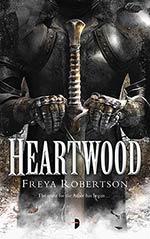
![]() nightxade
nightxade
12/4/2013
![]()
Peace between the people of Anguis is tenuous. In a last ditch effort to fix this, leaders from all realms gather together, but the peace talks are interrupted when mysterious and powerful water warriors attack, stealing the heart of the Arbor, the tree that is at the centre of all things.
After a lengthy discussion with a friend about religion in fantasy, reading Heartwood was very timely for me. The Arbor is the central figure in Robertson's pantheon, and she takes the time to carefully present how the different characters and realms feel about their religion and how those views change as the story progresses. The Militis defends the tree with their lives, but the loss of the Pectoris (the holy tree's heart), cuts some of them more deeply as it is a failure of their duty as well as an attack on their beliefs. Meanwhile, others take a more realistic view with their beliefs and some are even disturbed by the Arbor itself.
Nonetheless, when the Pectoris is stolen, all must work together to get it back and the journey they each take is both external and internal as they come to terms with their beliefs and with their personal struggles. However, this is where the book falters somewhat. To save the Arbor, five Nodes must be discovered and activated some how. This is conveniently discovered during the water warrior attack and disclosed in detail as new information is recited from long hidden tomes that shake the foundation of the practices surrounding the Arbor's care. Robertson's gaming influence becomes obvious as groups head off on their respective Quests. She does a great job of keeping the groups separate and unique, but the process of discovering the hidden tomes and the respective Nodes lacks subtlety.
This is a pervasive problem in the book, as much of the information about the world is delivered through extensive exposition that feels very much like reviewing a game codex. World building is always a difficult process and I praise Robertson for the beautiful and complex world she has created here, but again, the book could use more subtlety in teaching us about this world. World building is a necessary part of any story, but it can be very difficult to determine how much information should be handed out and it is not easy to avoid too much exposition. In some cases, Robertson attempts to find the balance by incorporating the lore through characters actually reading from history books, etc, or giving long speeches explaining the particular view points of their cultures, but this is all still obviously exposition that should be shown, not told.
That said, the world of Anguis is a beautiful one, and I love the way the religion is bound into it and the characters so deeply and how Robertson explores that. The characters themselves are interesting and, while their personal quests could use a bit more subtlety as well, they went through some very interesting transformations. I was particularly impressed with the twins, who have a strong bond, as is normal with twins, but there is a bitterness between them that Robertson takes the time to explore by separating them and leading them to a fate I hadn't expected. I'm also a huge fan of the intuitive character of Fulco, who speaks in sign language.
As the first book in the Elemental Wars series, and Robertson's first venture into the realm of epic fantasy, I imagine that she has learned quite a bit about the process. Since much of the lore has already been established, I'm looking forward to things really getting going with the sequel.
http://bibliosanctum.blogspot.ca/2013/11/book-review-heartwood-by-freya-robertson.html